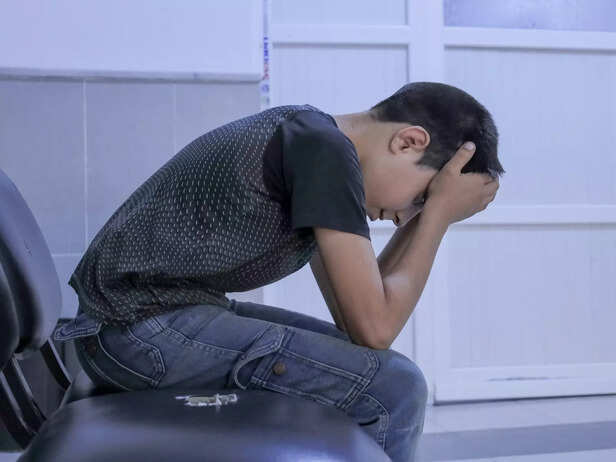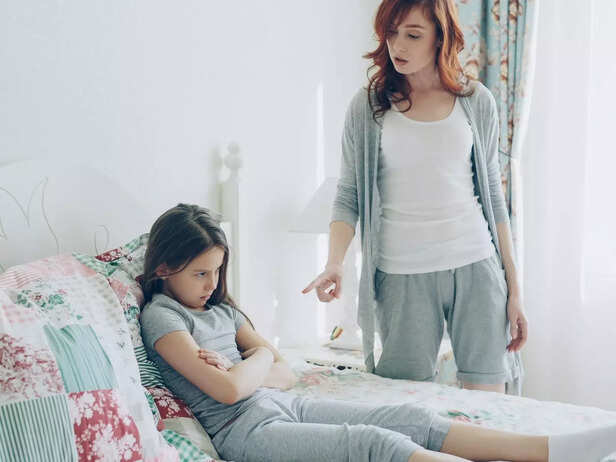5 Common Phrases by Parents That Hurt a Child’s Confidence
Ritika | Sep 22, 2025, 12:11 IST
A child being scolded
( Image credit : Freepik )
Parents never mean to harm their children, but in the process of losing anger or frustration, they could utter words that will remain with the child for the rest of his life and, eventually, shatter their confidence. Such words could define how the child views themselves and their self-worth. Being mindful of the words that are used when communicating to a child could be a game-changer for the child.
A child doesn't learn through rules or lessons. They learn through the tone of voice in their parent, through the repeated words. What is a throwaway comment to an adult can be permanent to a child. Some comments cut so deeply that they reappear later on in school, in relationships, even in adulthood. Most parents are unaware when they've uttered something that eats away at confidence. But those sentences are important. And some sentences just continue to reappear in households worldwide.

Comparisons are family favorites, but they sting. When a kid hears this, there is no question: who you are is not good enough. It doesn't drive them forward; it makes them feel smaller.
Sibling comparisons not only destroy confidence but also drive competition. One gets labeled as "better," the other is relegated to being in their shadow. Perhaps one excels at studies, and the other is artistic. Those special strengths get overlooked.
Over time, the compared child may stop trying, convinced that no matter what they do, they’ll never match up. Instead of growing into their own person, they get trapped in someone else’s mold.

Few words hit with as much force as these do. It not only criticizes today, it labels failure on the future. For a child who is still getting to know himself, it is like a tag that cannot be shed.
It’s usually said in frustration, maybe after repeated mistakes. But children don’t forget. They carry it inside, and each time they struggle later in life, the phrase plays again in their mind. “See? You’ll never amount to anything.”
That type of thinking kills self-belief. Children don't take risks, they worry about failing, and even when they do succeed, they can question it's real. What might have been motivation to do better becomes a curse they repeat.

Feelings are messy, and parents will attempt to control them with those words. But to a child, it sends a dangerous message: "Your feelings do not matter".
Crying is dismissed. Disappointment is waved away. Fear is treated as weakness. So instead of learning to handle feelings, the child learns to suppress them.
As they grow up, this appears in various forms. Perhaps they have difficulty opening up. Perhaps they avoid vulnerability, even when vulnerable. Confidence does not result from higher grades or achievements or accomplishments; it is established in the child when they are comfortable with their feelings, when their self-worth is not questioned, and they can express however they feel. But when feelings are ignored, so too is self-worth.

Errors are inherent. That's how children are taught. But when errors meet with this greeting, they begin to think that failure is who they are. Not only "this assignment did not work," but "I am wrong."
The result is harmful. Rather than attempting again, they're reluctant. Each new assignment is a trap in waiting. Self-assurance in figuring out solutions evaporates, replaced by fear of doing it wrong.
Some children become too timid, never venturing a step outside of what is known and safe. Others become perfectionists, unwilling to accept even minor errors. Both are born of the same source, fear of being told that they can't do anything correctly.

This one unjustly blames the child. It scolds a child that not only are they accountable for their own behavior, but also for a parent's anger, frustration, or mistake.
It is said softly, maybe when something gets spilled or broken. But the child interprets: "It's always my fault." Instead of learning healthy responsibility, they carry shame that is not theirs.
Growing up, these kids would become the ones who often apologize, stay away from conflicts, and are ever ready to shoulder the blame just for the sake of peace. That is because it gets difficult to build confidence in your own judgment when you’ve been told from the start that you’re the cause of every problem.
Words do not disappear once uttered, particularly during childhood. The five statements mentioned above might seem ordinary, even innocuous at the time, but they linger in a child's mind. They determine how kids perceive themselves and their destiny.
Kids need discipline. Kids need correction. But kids also need to know their worth is not negotiable. Language changes make a huge impact. Instead of comparing, parents can emphasize what makes each child different. Rather than invalidating feelings, parents can validate them. Rather than criticizing, parents can emphasize effort and progress.
Confidence isn't built by children alone. It forms when the voices around them, most of all, those they most believe in, tell them that they matter. Parents are not going to always have just the right thing to say, but if they are there, their words can be the source of strength, not self-doubt.
Explore the latest trends and tips in Health & Fitness, Spiritual, Travel, Life Hacks, Trending, Fashion & Beauty, and Relationships at Times Life!
1. "Why can't you be more like your siblings?"

A sad child
( Image credit : Unsplash )
Comparisons are family favorites, but they sting. When a kid hears this, there is no question: who you are is not good enough. It doesn't drive them forward; it makes them feel smaller.
Sibling comparisons not only destroy confidence but also drive competition. One gets labeled as "better," the other is relegated to being in their shadow. Perhaps one excels at studies, and the other is artistic. Those special strengths get overlooked.
Over time, the compared child may stop trying, convinced that no matter what they do, they’ll never match up. Instead of growing into their own person, they get trapped in someone else’s mold.
2. “You’ll never amount to anything.”

Child being scolded
( Image credit : Pexels )
Few words hit with as much force as these do. It not only criticizes today, it labels failure on the future. For a child who is still getting to know himself, it is like a tag that cannot be shed.
It’s usually said in frustration, maybe after repeated mistakes. But children don’t forget. They carry it inside, and each time they struggle later in life, the phrase plays again in their mind. “See? You’ll never amount to anything.”
That type of thinking kills self-belief. Children don't take risks, they worry about failing, and even when they do succeed, they can question it's real. What might have been motivation to do better becomes a curse they repeat.
3. "Why are you crying? It's not a big deal."

A sad parent and child
( Image credit : Pexels )
Feelings are messy, and parents will attempt to control them with those words. But to a child, it sends a dangerous message: "Your feelings do not matter".
Crying is dismissed. Disappointment is waved away. Fear is treated as weakness. So instead of learning to handle feelings, the child learns to suppress them.
As they grow up, this appears in various forms. Perhaps they have difficulty opening up. Perhaps they avoid vulnerability, even when vulnerable. Confidence does not result from higher grades or achievements or accomplishments; it is established in the child when they are comfortable with their feelings, when their self-worth is not questioned, and they can express however they feel. But when feelings are ignored, so too is self-worth.
4. "Why can't you ever do anything right?"

An angry father
( Image credit : Pexels )
Errors are inherent. That's how children are taught. But when errors meet with this greeting, they begin to think that failure is who they are. Not only "this assignment did not work," but "I am wrong."
The result is harmful. Rather than attempting again, they're reluctant. Each new assignment is a trap in waiting. Self-assurance in figuring out solutions evaporates, replaced by fear of doing it wrong.
Some children become too timid, never venturing a step outside of what is known and safe. Others become perfectionists, unwilling to accept even minor errors. Both are born of the same source, fear of being told that they can't do anything correctly.
5. "Look at what you made me do."

An angry mother
( Image credit : Unsplash )
This one unjustly blames the child. It scolds a child that not only are they accountable for their own behavior, but also for a parent's anger, frustration, or mistake.
It is said softly, maybe when something gets spilled or broken. But the child interprets: "It's always my fault." Instead of learning healthy responsibility, they carry shame that is not theirs.
Growing up, these kids would become the ones who often apologize, stay away from conflicts, and are ever ready to shoulder the blame just for the sake of peace. That is because it gets difficult to build confidence in your own judgment when you’ve been told from the start that you’re the cause of every problem.
Key Takeaway
Kids need discipline. Kids need correction. But kids also need to know their worth is not negotiable. Language changes make a huge impact. Instead of comparing, parents can emphasize what makes each child different. Rather than invalidating feelings, parents can validate them. Rather than criticizing, parents can emphasize effort and progress.
Confidence isn't built by children alone. It forms when the voices around them, most of all, those they most believe in, tell them that they matter. Parents are not going to always have just the right thing to say, but if they are there, their words can be the source of strength, not self-doubt.
Explore the latest trends and tips in Health & Fitness, Spiritual, Travel, Life Hacks, Trending, Fashion & Beauty, and Relationships at Times Life!
